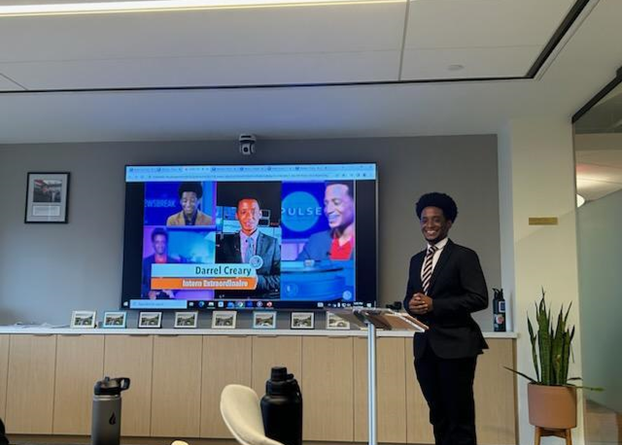Privileged doesn’t begin to describe how I felt…
Being able to work in DC alone was amazing, but working in the company of eight other fellows was stupendous. Our closeness was something I got to look forward to, and it was in this that I was able to build my confidence. Being matched with Greenpeace during some of the largest heights in climate change (global wildfires, new legislation, highest recorded temperatures) allowed me to study the waves non-profits rode to tackle these issues with the right audience. And being a journalism major, I had to find every angle to set the tone for the right story.
A lot of my time was spent reading in the Greenpeace office. Most of their catalog connected to the roots of the organization, which were founded on the rise of the post-war era hippie movement, and evolved to expose the true problem in environmental advocacy: poor communication. Ironic, given that climate change dominates as a major topic in the media, but the pathways we communicate about it often go overlooked.
We picture a basic conversation in two points: a messenger and a receiver. We often ignore, however, why power plays a factor in separating the two, and once politics comes into the picture, true change often becomes lackluster. We as a society settle for the baby steps taken on the capitol, followed by major clashes that are masked with empty campaign promises. Our elected officials are disconnected from the public and begin to echo what we want to hear with no true interest. This, in turn, shows the urgency of relating climate advocacy to democracy. Our vote becomes essential.
Moving outside of politics brings us to the core of communication: language. One of the largest benefits of this fellowship is its multicultural experience. Most of the interns were bilingual and could all, to some degree, fill the barriers to international advocacy. I was soon to find out that basic translation doesn’t cut it. Language is wildly transformative, and culture is never stagnant, so fitting all of the nuances to truly connect with an audience instead of prodding at them seems to be a demand that our society has yet to cater to. But we’re getting there.

The way we connect is a quintessential part of the human experience. From relaying the things we see, how we feel and navigate our world to sharing the desire to thrive has always defined us. This is what makes us finite, adding value to each moment that prepares the next generation for what lies ahead. Togetherness is what builds our future.
DC is an ever-shifting, interconnected web of potential, and with each person that comes along, it continues to evolve and expand new ideas. Greenpeace has allowed me to nurture my own creativity by editing content for their mission, working alongside dedicated and compassionate people, and learning more about advocacy every day. I’ve left this fellowship with a deep understanding of public interest communications, one that I can hope to use to bridge audiences to the news they deserve to hear.

